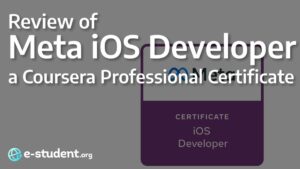
7 Best Screenwriting Courses for Scripts that Sell
These are our picks for the 7 best screenwriting courses that’ll teach you how to write professional scripts for any medium.
Planning for a career as a Cloud DevOps Engineer and pursuing Google Cloud's certification? In this review, we'll look in detail at the preparatory Professional Certificate course on Coursera.
E-student.org is supported by our community of learners. When you visit links on our site, we may earn an affiliate commission.
4.2 / 5
The "Preparing for Google Cloud Certification: Cloud DevOps Engineer" course is an all-inclusive online training program designed to equip learners for a career as a DevOps Engineer in cloud computing. The course delivers a blend of essential and advanced topics, from the fundamentals of Google Cloud Platform to specialized areas like Site Reliability Engineering (SRE). With an emphasis on real-world applicability through case studies and hands-on labs, this course offers a multifaceted learning experience, making it an indispensable resource for both newcomers and experienced professionals aiming for Google's Cloud DevOps Engineer certification.
Cloud computing is fundamentally reshaping the IT landscape. DevOps engineers have emerged as key players in this transformation, responsible for bridging the gap between software development and IT operations. Their role is crucial in cloud environments, where rapid deployment and scalability are essential.
While exploring the latest trends in software engineering and cloud technologies, I came across the ‘Preparing for Google Cloud Certification: Cloud DevOps Engineer’ course on Coursera. This course is a product of Google Cloud, one of the major players in the cloud services market – and is geared towards working within their ecosystem.
The course’s comprehensive syllabus promises to cover a wide array of topics, from the details of the Google Cloud Platform to advanced concepts in Site Reliability Engineering (SRE). Given the industry’s need for skilled DevOps engineers and the comprehensive nature of this program, I was compelled to enroll. In the following review, we will dissect the program, comparing its content and structure against broader industry trends and my own journey in software development.

The course is designed for professionals aiming to upskill in the realm of cloud and DevOps. Learners are provided with an array of tools and technologies specific to Google Cloud. To make the learning experience more robust, the course includes quizzes and mini-projects aimed at assessing understanding and reinforcing key concepts. The curriculum also goes a step further to make it practically applicable and weaves in a series of hands-on exercises and real-world projects. These range from the practical configuration of key Google Cloud services to the intricate setup of Continuous Integration/Continuous Deployment (CI/CD) pipelines.
The course also includes a variety of supplementary resources. From in-depth articles to instructional videos, these additional materials cater to those who wish to delve deeper into specific topics. Whether you are interested in mastering Kubernetes orchestration or want to explore the nuances of Site Reliability Engineering (SRE), these resources serve as beneficial extras that augment the primary learning objectives.
To ensure a well-rounded learning journey, the program integrates a variety of Google Cloud-specific technology stacks and tools critical for DevOps roles.

When considering alternatives, there are several other DevOps and cloud computing courses available. AWS offers a DevOps Engineer certification (and a preparatory course on Coursera), and Microsoft provides a Microsoft Certified: Azure DevOps Engineer Expert certification. Both are robust programs that serve a similar purpose: equipping you with the skills needed to excel in a DevOps role focused on a specific cloud platform.
For those who are already familiar with Google Cloud Platform and are looking to specialize further, Google Cloud also offers other certifications like the Professional Cloud Architect or the Professional Data Engineer. These can complement your Cloud DevOps Engineer skills by offering a broader or more specialized focus, depending on your career goals.
Training platforms like Udacity and Pluralsight offer nano-degree programs and skill paths in DevOps and cloud computing. While Udacity’s nanodegree programs are structurally similar to Coursera’s Professional Certificates, Pluralsight provides a more flexible, self-paced learning environment, which might be better suited for professionals who cannot commit to a structured course timeline.
For learners on a budget, websites like freeCodeCamp offer numerous tutorials and projects that can help you acquire similar skills, albeit without the same level of structured guidance.
While the program starts with foundational concepts, making it more accessible for learners of all backgrounds, those targeting the Google Cloud Professional Cloud DevOps Engineer certification exam should ideally have a few years of industry experience in cloud engineering or DevOps roles, as recommended by Google Cloud.
The course operates under Coursera’s monthly subscription model, with a standard rate of $59 per month, depending on the location. Alternatively, you can save a bit by paying $49 per month if you don’t need access to other courses via Coursera Plus. This subscription provides an all-inclusive access pass to the course, including all quizzes, peer-reviewed assignments, discussion forums, and interactive lessons. If your learning plans include taking multiple Coursera courses, consider opting for Coursera Plus. Priced at $399 annually, this subscription can be a cost-effective way to engage with a broader range of topics.
Note that the subscription fee is specific to the Coursera platform and does not include the additional cost required to sit for the Google Cloud Professional Cloud DevOps Engineer certification exam. This is a separate expense and varies depending on the region.
Coursera facilitates informed decision-making with a 7-day free trial. During this period, you can explore the course content, gauge the depth of the material, and assess if the course aligns with your career trajectory and skill development goals.
The audit option on Coursera offers another option for those on a tight budget. While free, it does come with limitations: no access to graded assignments, quizzes, or a Course Certificate. You can, however, switch to a paid subscription anytime to unlock the full course features.

The skills acquired through this course are not just theoretical but are immediately applicable in a professional setting. These skills can position you favorably in the job market, making you a desirable candidate for roles in cloud computing and DevOps.
The course also serves as an excellent preparatory pathway for the Google Cloud Professional Cloud DevOps Engineer certification exam. Earning this certification can be a significant career milestone, often leading to job promotions or new job opportunities with higher earning potential.
While the course comes with a subscription cost and potentially an additional certification exam fee, these should be weighed against the career benefits. The immediate applicability of the course content to real-world job scenarios, along with the potential for career advancement, makes a compelling case for the course’s value.
For those hesitant about the financial investment, the free audit option provides a way to gauge the course’s relevance and quality. Although limited in functionality, it offers a glimpse into the course material, allowing you to make an informed decision about upgrading to the paid version.
The Google Cloud Training team is the driving force behind the program. Their background in serving enterprise customers and partners ensures that the course material is tailored for real-world applications. Focused on aspects like security, reliability, and scalability through real world projects, the team is focused on not just imparting theoretical knowledge in this preparatory course.

The structure of the program comprises multiple targeted courses sequenced in a manner that each course serves a designated role, ranging from laying the foundational understanding of Google Cloud’s infrastructure to subjects like Site Reliability Engineering (SRE) and Kubernetes orchestration.

As the program is structured to prepare you for the Google Cloud Professional Cloud DevOps Engineer certification exam, each course is structured to comprehensively cover the exam’s syllabus. However, the program’s scope is more than just exam preparation and aims to impart a solid understanding of Google Cloud technologies and their real-world applications.
Let us now have a closer look at each course within this curriculum. The courses included are:
The course offers an in-depth analysis of Google Cloud’s core architecture and services. It covers the underlying infrastructure, including data centers, regions, and zones, with a focus on how they integrate to form a robust, scalable platform. Students will learn the nuances of different cloud service models, specifically Infrastructure-as-a-Service (IaaS) and Platform-as-a-Service (PaaS), to choose the appropriate service based on varying needs. The course explores critical cloud concepts like resource organization through projects and access management via Identity and Access Management (IAM).
This is all foundational for subsequent courses in this certification program but also provides a foundational skill set essential for any role requiring Google Cloud expertise. Note that as a foundational course, this module is shared by several Coursera programs related to cloud computing – you may already have completed this if you already followed another related program.

This course delves into the principles of Site Reliability Engineering (SRE) as advocated by Google, focusing on its symbiotic relationship with DevOps. By examining Google’s technical and cultural underpinnings of SRE, students will gain insights into how these practices can be adapted and implemented within their own organizations. The course leverages case studies and real-world examples to facilitate this understanding.
Practical exercises and labs aim to develop skills in leadership, management, and collaboration within the context of SRE. These hands-on activities are designed to help students assess the maturity level of SRE adoption within an organization, allowing them to create actionable plans for improvement. The course is a comprehensive guide for transitioning to an SRE culture, with measurable metrics for success.
The course also covers essential soft skills such as communication and collaboration. Students will learn to articulate the technical aspects of SRE effectively to different stakeholders, thereby playing a pivotal role in organizational change toward adopting SRE principles. These skills are invaluable in implementing a culture shift within an enterprise environment, making the course beneficial for not just DevOps engineers but also for team leaders and managers.

The course provides an exhaustive study of the design principles and processes that contribute to Google Cloud’s reliability. Students will learn how to define application requirements and quantify them through Key Performance Indicators (KPIs), Service Level Objectives (SLOs), and Service Level Indicators (SLIs). The curriculum includes modules on architecting cloud and hybrid networks, enabling students to design resilient, scalable solutions.
Practical labs focus on the deployment and configuration of Google Cloud storage services, providing hands-on experience in securing cloud applications, data, and infrastructure and offering an applied understanding of monitoring service levels, thereby enabling students to maintain optimal application and data performance.
The course also covers more advanced topics like microservice applications, offering a comprehensive view of service architecture in a cloud environment. Students will gain a thorough understanding of Google Cloud’s console and Cloud Shell, which are essential tools for navigating and managing Google Cloud resources effectively. This prepares them for complex cloud infrastructure projects, setting a solid foundation for roles in cloud architecture and DevOps.

This course offers an intricate understanding of monitoring infrastructure within the Google Cloud ecosystem. Students will gain the skills required to plan and implement a robust logging and monitoring infrastructure, encompassing both hardware and software components. The course covers the theory and practical application of defining Service Level Indicators (SLIs) and Service Level Objectives (SLOs), which are critical for maintaining high availability and performance.
Hands-on labs and exercises focus on the creation of effective monitoring dashboards and alerts. These practical components are designed to equip students with the skills to monitor, troubleshoot, and improve Google Cloud infrastructure actively. By understanding the logging capabilities of Google Cloud, students will be able to implement an observability strategy that enhances system reliability and responsiveness.
Beyond technical aspects, the course also delves into the strategies for effective monitoring. It discusses the importance of aligning monitoring objectives with business goals, thus ensuring that technical efforts are directly contributing to organizational success.

The course provides an in-depth look into container orchestration with Google Kubernetes Engine (GKE), beginning with the fundamental principles of containerization and Kubernetes. Students will understand the architectural differences among Google Cloud compute platforms, enabling them to make informed decisions based on the specific requirements of a project. The course covers key Kubernetes concepts and components, providing a thorough grounding for advanced topics in container management.
Practical exercises focus on the creation and management of GKE clusters. Students will gain hands-on experience using Google Cloud’s console and the gcloud/kubectl command-line tools, which are essential for effective cluster management. These labs serve as a bridge between theoretical knowledge and practical skills, preparing students for real-world challenges in Kubernetes orchestration.
The course also discusses the relationship between Kubernetes and GKE, providing insights into how Google manages container orchestration at scale. Through a blend of theory and practice, students will acquire the competencies needed to architect, deploy, and manage containerized applications. This comprehensive approach ensures that graduates of this course are well-equipped to handle the complexities of modern cloud-native environments.

The program is highly commended for its structured approach, allowing students to grasp complex topics in Google Cloud technologies and DevOps practices. Students find the hands-on labs and real-world projects especially useful, as they offer practical experience in interacting with Google Cloud services. This blend of theoretical learning and hands-on practice is seen as a major strength of the program.
Another significant highlight is the program’s focus on Google’s Site Reliability Engineering (SRE) principles. Students appreciate the in-depth treatment of this topic, which includes reflection activities and case studies. This multifaceted approach not only helps learners understand the technical aspects of SRE but also shows them how to implement these practices within their own organizations.
The program also receives praise for its balanced curriculum, which covers a wide range of topics, including DevOps principles, error budgets, and automated monitoring. The hands-on labs serve to reinforce these theoretical concepts, making them immediately applicable in a professional environment. This is especially valuable for students looking to apply their new knowledge in real-world scenarios quickly.
The program is not without its criticisms. Some students mention minor technical issues, particularly with navigating the labs and logging into Qwiklabs accounts. These issues are largely considered to be minor setbacks in an otherwise effective and comprehensive educational experience.

The “Preparing for Google Cloud Certification: Cloud DevOps Engineer” course stands out as a comprehensive training program designed to equip you with the skills and knowledge needed for a successful career in Cloud DevOps Engineering. Developed by Google Cloud, the course brings with it a level of credibility that is unmatched, making it an excellent choice for those serious about a career in this field.
While the course offers a Professional Certificate upon completion, it is crucial to understand that this is different from the Google Cloud Certification. The latter requires you to clear a separate examination and comes with an additional fee. However, the Professional Certificate is a potent indicator of your skills and will certainly enhance your professional profile.
It is advisable to engage in self-study to further enhance your skills. Google’s extensive documentation offers in-depth information that can supplement what you learn in the course. Other educational resources, such as webinars, online forums, and third-party study materials, can provide different perspectives and approaches that can be invaluable in your learning journey.
While the course does a commendable job of covering the important aspects of Cloud DevOps, it is not the end of your learning path. Continuous learning is key to staying updated in this ever-changing field. Regularly engage with community forums, attend webinars, and read up on the latest trends and technologies in cloud computing to ensure that your skills are always up to date.
For those specifically targeting the official Google Cloud Certification, this course should form the backbone of your preparation strategy. However, it should not be your only resource. Invest in dedicated exam guides and practice tests to simulate exam conditions. This will not only bolster your confidence but also give you a clearer idea of what to expect in the actual exam, thereby improving your chances of success.
If you are serious about a career in Cloud DevOps and are aiming for Google Cloud Certification, enrolling in this course is a decision you are unlikely to regret. It is comprehensive, practical, and developed by one of the most credible names in the industry. It is important to remember that the key to truly excelling in this field lies in continuous learning and practical application of the skills you acquire.


These are our picks for the 7 best screenwriting courses that’ll teach you how to write professional scripts for any medium.

Learn the skills required to become a data analyst with some of the best data analytics courses on the market.

Are you trying to find the best online course to get started developing iOS apps? Read our review of Meta’s new Professional Certificate on Coursera.